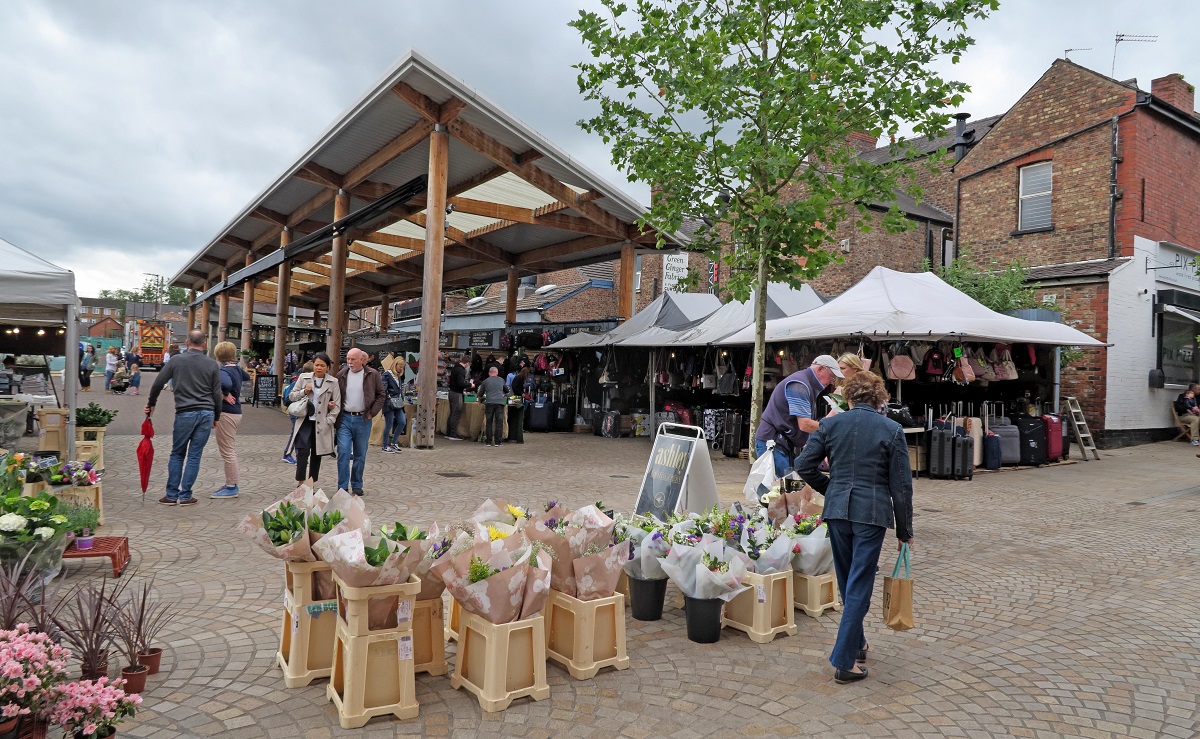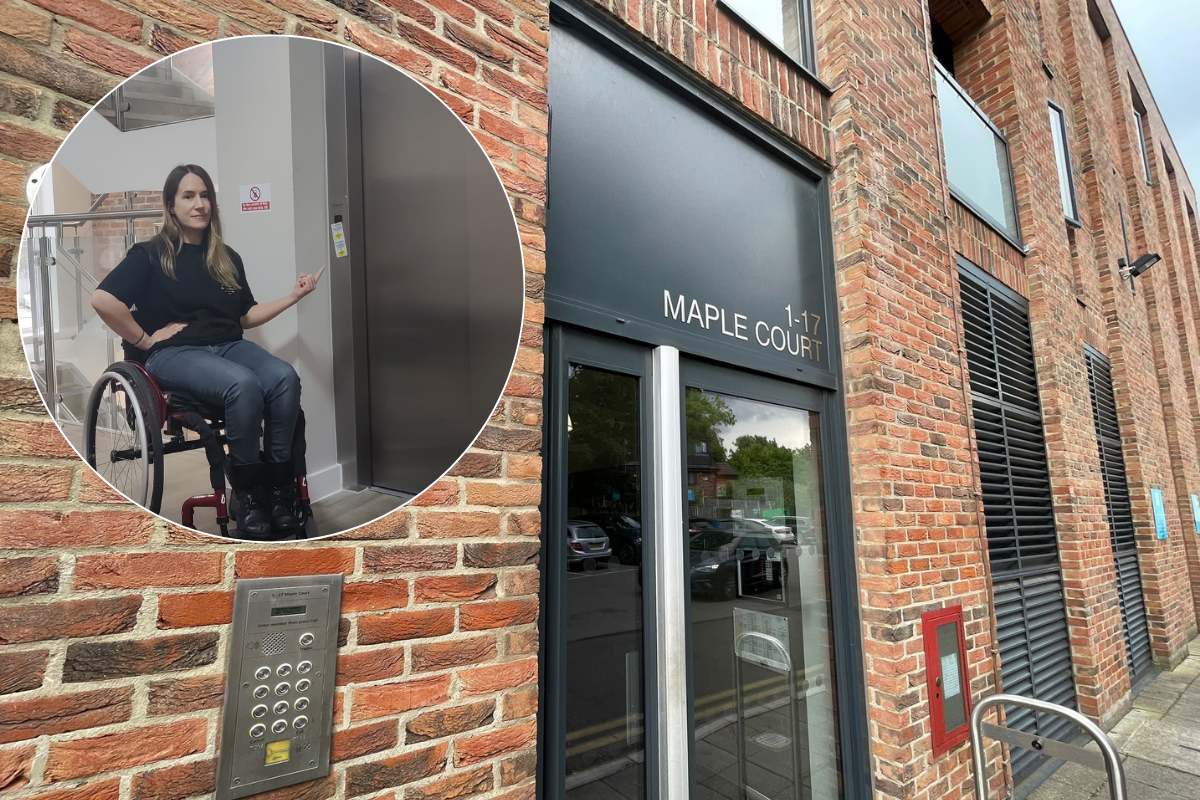Digitally excluded in Altrincham losing access to vital services
The issue of digital exclusion is growing in Altrincham and the wider UK - despite the area not having the highest levels of deprivation in Greater Manchester.
Anne* needed to apply for a Blue Badge, which has to be done online in Trafford. But she doesn’t have access to the internet or an email address.
An older male resident’s landline had stopped working but as he didn’t have a mobile phone, or access to the internet, he couldn’t contact the phone company to get it repaired.
Altrincham and Sale may not have the highest levels of deprivation in Greater Manchester but people living here can still endure digital exclusion. And the problem is growing, say experts.
Good Things Foundation, a digital inclusion charity, says eight million households in the UK – 28% – have difficulty affording communications services, a figure that began rising in early 2022 after the cost of living crisis took hold. Around 1.5 million households don’t have a smartphone, tablet or a laptop. It adds that 8.5 million people lack basic digital skills.
According to communications regulator Ofcom, households with children, those in receipt of benefits, or with a resident with an “impacting/limiting condition” are most likely to have difficulty affording communications services. And with education, health and welfare services increasingly online, they are also the people most likely to be harmed by digital exclusion.
“Banking, healthcare, travel, job applications, the benefits system and many other public services are increasingly only accessible online,” says Hayley Wright, communications and engagement lead for Citizens Advice Stockport, Oldham, Rochdale and Trafford.
“Those who cannot access them online, whether through lack of skills or ability, access or affordability, are excluded – and these are often vital services such as booking doctors appointments, accessing benefits they are eligible for or applying for jobs.”
Wright says digital exclusion is linked to wider inequalities in society and is more likely to be faced by people on low incomes, people aged over 65 years and those with a disability. Most jobs are only advertised online now and those with internet access are increasingly turning to online offers and price comparison websites to save money.
But Citizens Advice research shows that in 2022-23 one million people disconnected their broadband because they couldn’t afford it.
“The cost of connectivity is a growing factor in digital exclusion,” says Wright “Those who are digitally excluded are missing out.”
The Greater Manchester Combined Authority’s DERI tool highlights areas of low or poor connectivity, scoring areas out of 10 for risk. Sale and Altrincham’s scores are relatively low risk, says Wright, “but not insignificant”.
She says local Citizens Advice staff anecdotally report a rise in people coming to them with problems accessing key online accounts, in particular energy, in order to understand their rising bills.
Those staff helped Anne make her Blue Badge application when she came to a Trafford drop-in, and library staff assisted her in uploading documents, but it’s not an isolated incident, they say.
As well as drop-ins, Citizens Advice can offer people in Altrincham and Sale face-to-face appointments and a free phone line. Staff can help people complete online forms and set up online accounts for Universal Credit or local government services.
It is also part of the National Databank, which means it can provide free mobile SIM cards for people who need internet connectivity.
So too can Sale Moor Community Partnership, a charity formed in 2005 in an area where half the population of 10,000 live around or below the poverty line, according to its manager, Jamie Rennie.
Tackling digital exclusion is an important part of the charity’s work and reveals itself in a number of ways.
From its new base at Sale Moor Community Centre on Norris Road, Rennie and colleagues can give out free six-month SIM cards loaded up with 20GB of data, free calls and text. Donated by Vodafone, they can be a lifeline for many, “because the biggest thing we’re finding is just cost”, says Rennie.
One of the biggest challenges for people struggling digitally is accessing the benefits system, and particularly Universal Credit, which is “punitive and deliberately so”, says Rennie. A claimant’s failure to update their log or respond to an appointment can quickly result in a crippling sanction, and if people can’t access online banking, the financial problem becomes more complicated.
He has also heard of residents missing health appointments because details have been sent to a phone that doesn’t work or has no credit on it.
“Empathy from the front desk can then be minimal,” says Rennie. “That’s not everywhere – there are some brilliant GP practices – but sometimes people get told: ‘We won’t make you another appointment because you missed this one.’ That’s a devastating blow to someone who is trying to look after themselves.”
As well as helping with costs, Sale Moor Community Partnership seeks to improve people’s digital skills.
Some get used to a computer but it breaks and they can’t afford to fix it. They have to learn to use their phone to access services but they may have problems with mobility and disability.
Others have gone back from a phone to using a computer but it isn’t up to date, and they struggle to learn a new operating system.
Particularly since Covid, the centre is seeing a lot of older people who have relied on sons or daughters to keep them up to date with benefits or other online necessities, only for them to have moved away or a relationship breaks down. That can be “very, very challenging” for them, says Rennie.
It’s not a problem confined to older people though. The centre is helping lots of men aged 35-55, often ex-services, whose relationship has hit the rocks and they’re now living on their own. They relied on their wives, sons or daughters to do their online stuff, and they may have run out of credit because they’ve spent their money on drink or drugs. Missed appointments lead to sanctions and further spiralling.
“The other part of digital exclusion is just being able to see what’s going on in your community or around you,” adds Rennie. Around 500 properties run by housing association L&Q in the area are for sheltered accommodation and those residents are “often living in a bubble”.
The charity, still settling into its new home and looking to recruit staff and volunteers, will revive its magazine soon, as people who aren’t on social media – or don’t have digitally connected people around them any more – still rely on print more than Facebook for community news.
“The online stuff, and this is key for me, is almost exclusionary in itself.”
Rebuilding capacity at the charity will also allow it to strengthen its tailor-made approach to teaching digital skills and meet the demand. In contrast to standard IT classes, Rennie says: “We always approached it from a very individualistic angle – what is your issue, what is your device? How do we solve it on that device so you can walk away from here and do it?”
That can mean useful hacks like teaching someone to cut and paste their personal details, so they don’t have to type them out painstakingly when they’re in an endless 8am online queue for a GP appointment.
That can help reduce anxiety, says Rennie. But better digital skills can materially add to wellbeing as well as preventing it draining away.
The charity recently helped an elderly woman sort out a problem with her Sky subscription. "It’s a bit of a necessity to be able to watch TV in your old age,” says Rennie. “What else have you got on?”
Rennie, who is also an artist, and a colleague helped a woman who wrote poetry to get her work laid out, illustrated and turned into a book.
“We’ve done stuff like that with people who are literate but might not understand that next level, and that’s what’s stopping them from being an entrepreneur or forming their own little music production company. Or they were really good at graphic design but they were crap at Word and Excel.”
Trafford Council is also making efforts to tackle digital exclusion across the borough, including Altrincham and Sale. It has launched Tech4All, a scheme to sell refurbished laptops donated by L&Q for £60 to low-income residents in need. It also includes free O2 SIM cards.
Tech4All provided 110 laptops at its first pop-up event in Old Trafford, with further events including Altrincham Library and Sale Waterside also attracting demand. The laptops come with routers and lifetime Microsoft licenses.
The project is the result of several years work, says Liz Patel, Trafford Council’s executive member for economy and regeneration, but the impact of digital exclusion was highlighted even more during the Covid pandemic. Older people were isolated, younger people were excluded from home schooling.
“Then increases in the cost of equipment and broadband have led to it becoming much more of a widespread issue,” says Patel.
“As a local authority we are conscious a lot of our services are online. We’ve got ambitions around improving skills and employment and health inequalities, and if we’re failing on the basics of people being able to have a strong, reliable broadband connection and the skills to go with it, we are not getting through and we are not able to help.”
Local authorities are hardly awash with money and Trafford is a member of the L20 group of councils with the worst funding settlements from central government. But it has an inclusive economy team and a digital inclusion officer within that, part-funded by GMCA.
“A critical element is partnership with the private sector,” says Patel. “We’re always on the lookout for big businesses looking to update their IT and donate the old equipment.”
For Trafford resident Sheriff Fatty , the £60 laptop has been a “game-changer”. A carer for his wife, he bought the Tech4All device for the younger of his two daughters, mainly for her to do her homework.
His older daughter had been borrowing a laptop via a Trafford Council library loan scheme and was eventually allowed to keep it. That was “very welcome”, says Sheriff, but the two sisters had to share it.
“They were pushing and pulling each other when they wanted to do their homework on time. This one had to work and this one had to wait.
“My child was struggling before to keep up with her studies due to a lack of access to a computer and reliable internet at home.
“With the new laptop she can do her research and complete her assignments. She has access to educational resources online.”
Sheriff allows his daughters, who both want to become nurses, to play games on their devices as well – but only at the weekend.
“I cannot thank the council enough for this kindness and for their efforts in promoting digital inclusion.”
Jeremy Corbyn was pilloried for communist public spending extravagance when he promised free broadband for all in 2019, but post-Covid and in the cost of living crisis, it seems a far less fanciful idea. There is nothing specific in Labour’s current manifesto about tackling digital exclusion but, just before the election, Peter Kyle, shadow secretary of state for science, innovation and technology, told London Tech Week that a Labour government would “lead by example” by looking to donate laptops, tablets and phones when they are no longer used by government departments.
“Once they are cleaned up and secured they can be reused by people who need them instead of being put in a landfill,” said Kyle.
That’s a pledge worth keeping an eye on.
* Name has been changed
The Lead is now on Substack.
Become a Member, and get our most groundbreaking content first. Become a Founder, and join the newsroom’s internal conversation - meet the writers, the editors and more.





